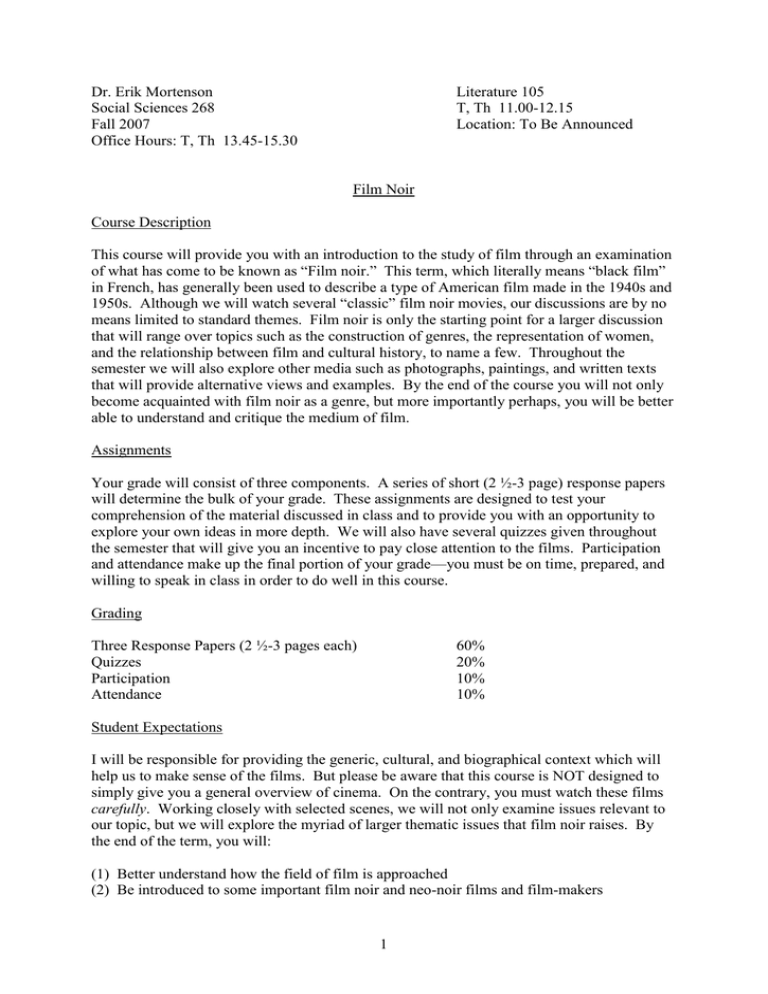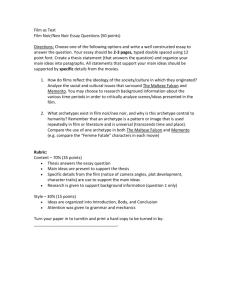Dr. Erik Mortenson Literature 105 Social Sciences 268
advertisement

Dr. Erik Mortenson Social Sciences 268 Fall 2007 Office Hours: T, Th 13.45-15.30 Literature 105 T, Th 11.00-12.15 Location: To Be Announced Film Noir Course Description This course will provide you with an introduction to the study of film through an examination of what has come to be known as “Film noir.” This term, which literally means “black film” in French, has generally been used to describe a type of American film made in the 1940s and 1950s. Although we will watch several “classic” film noir movies, our discussions are by no means limited to standard themes. Film noir is only the starting point for a larger discussion that will range over topics such as the construction of genres, the representation of women, and the relationship between film and cultural history, to name a few. Throughout the semester we will also explore other media such as photographs, paintings, and written texts that will provide alternative views and examples. By the end of the course you will not only become acquainted with film noir as a genre, but more importantly perhaps, you will be better able to understand and critique the medium of film. Assignments Your grade will consist of three components. A series of short (2 ½-3 page) response papers will determine the bulk of your grade. These assignments are designed to test your comprehension of the material discussed in class and to provide you with an opportunity to explore your own ideas in more depth. We will also have several quizzes given throughout the semester that will give you an incentive to pay close attention to the films. Participation and attendance make up the final portion of your grade—you must be on time, prepared, and willing to speak in class in order to do well in this course. Grading Three Response Papers (2 ½-3 pages each) Quizzes Participation Attendance 60% 20% 10% 10% Student Expectations I will be responsible for providing the generic, cultural, and biographical context which will help us to make sense of the films. But please be aware that this course is NOT designed to simply give you a general overview of cinema. On the contrary, you must watch these films carefully. Working closely with selected scenes, we will not only examine issues relevant to our topic, but we will explore the myriad of larger thematic issues that film noir raises. By the end of the term, you will: (1) Better understand how the field of film is approached (2) Be introduced to some important film noir and neo-noir films and film-makers 1 (3) Develop a vocabulary for talking about film and other visual media Perhaps even more importantly, you will also: (1) Engage the ideas and themes in these films in order to improve critical thinking skills (2) Become better viewers (3) Hone your ability to read, write, understand, and speak the English language Instructor Expectations In order to make this course enjoyable for everyone (myself included), I ask you to bring two things to every session—an open mind and a respect for others. I expect everyone to listen attentively to their colleague and to contribute positively to the discussion. For this class to work, you need to take film seriously and be prepared to talk about your ideas. Please turn off your cell phones, do not arrive late or leave early, and be quiet when others are talking. We will have fun in this course, but I expect full preparation and attention at all times! Policy on Plagiarism The principle of honesty is recognized as fundamental to a scholarly community. Students are expected to honour this principle—any student caught plagiarizing the work of another will be expelled from the course and subject to further disciplinary action. If you are unsure what constitutes plagiarism, see me before handing in your work. Attendance Policy You are expected to attend every session of the course. To be considered present you must be on time with the course materials for that day. Do not expect to watch these films outside of class—I will also be making announcements and comments, so attendance is necessary for you to do well. If you are absent, it is your responsibility to find out what we covered that day and to get a copy of materials handed out in class. Attendance grades will be calculated as follows—if you attend 90% of class meetings you get an “A” for participation, 80% a “B,” and so on. Every three times you are late counts as an absence. Tentative Schedule (Subject to Change) Sept. 18 (T) 20 (Th) 25 (T) 27 (Th) Hand out syllabus Introduction to course The Cabinet of Dr. Caligari (1920) Caligari Oct. Caligari; Discuss Paper #1 Citizen Kane (1941) Citizen Kane Şeker Bayramı—No class Citizen Kane Maltese Falcon (1941); Paper #1 Due Maltese Falcon Maltese Falcon Maltese Falcon 2 (T) 4 (Th) 9 (T) 11 (Th) 16 (T) 18 (Th) 23 (T) 25 (Th) 30 (T) 2 Nov. 1 (Th) Workshop Paper #1; Discuss Paper #2 6 (T) Touch of Evil (1958) 8 (Th) Touch of Evil 13 (T) Touch of Evil 15 (Th) Blade Runner (1982) 20 (T) Blade Runner 22 (Th) Blade Runner; Paper #2 due 27 (T) Blue Velvet (1986) 29 (Th) Blue Velvet Dec. 4 (T) 6 (Th) 11 (T) 13 (Th) 18 (T) 20 (Th) 25 (T) 27 (Th) Workshop Paper #2; Discuss Paper #3 Blue Velvet Memento (2000) Memento Memento The Good German (2006) The Good German; Paper #3 due Summary of Course 3


